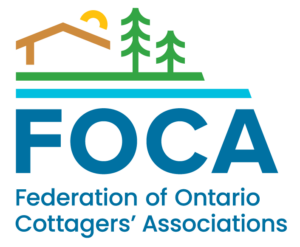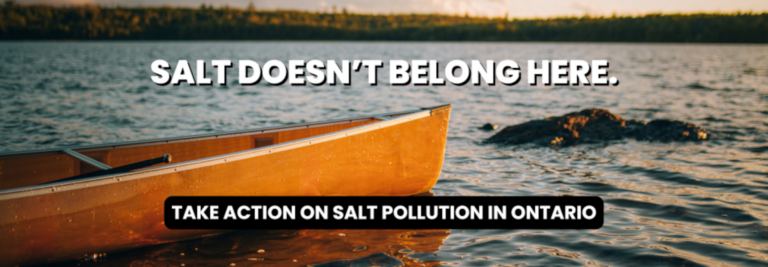
The issue of rising chloride (salt) levels, and related impacts on Ontario’s lakes and rivers is a topic of concern for FOCA.

Salt is accumulating in the environment and poses an emerging threat both to ecosystems and human health.
Once introduced into an ecosystem, salt can become a persistent problem, since there are really no biological processes that will remove it. Reducing the amount of salt entering waterways is an important way to protect our aquatic ecosystems.

October 2025 – Fighting Salt with Science: Community scientists make the difference (Water Canada) – pp14-16
August 24, 2025 – Muskoka joins others in calling on the Ontario government to address salt pollution (Doppler Online)
EARLIER NEWS:
July 2025 – the Ontario Salt Pollution Coalition (OSPC) is pressing for provincial action to prevent salt over-usage, which has several negative impacts – from environmental risks and water quality impacts, to infrastructure damage and increased snowplow liability insurance costs due to slip-and-fall lawsuits.
Join OSPC’s letter-writing campaign until August 10, 2025, asking the Province to create a salt-use certification process for winter contractors, and to provide improved legal protection to those who follow provincially endorsed best practices. FOCA and Landscape Ontario have made this appeal to Ontario’s Attorney General numerous times over the past 5 years!
OSPC has also posted a Municipal Resolution Toolkit that you can bring to the attention of your local township, encouraging them to write the Province in support of this effort. More than a dozen Ontario municipalities have already passed resolutions supporting the need for provincial action on salt pollution, including the District of Muskoka and the City of Sudbury.
June 2025 – watch a webinar from Partners in Project Green and the Toronto Regional Conservation Authority: Challenges to Reducing Winter Salt Use: Addressing Limited Liability in Ontario (YouTube)
2025 – Friends of the Muskoka Watershed has published a report authored by Neil Hutchinson titled “Citizen Science Investigations of Road Salt Pollution in Muskoka: 2022-2024“. According to the report, “there are no natural local marine salt deposits in Muskoka, and the lakes with elevated Chlorine levels all have major winter-maintained highways in their immediate catchments.”
The report noted that over 600 measurements were made at 27 Muskoka sites by community volunteers. Samples from sites with water courses with potential runoff from road salting showed approximately a 5-fold increase in conductivity over the sites with minimal runoff, while the storm drain samples exhibited 125 times the conductivity. The study concluded there was “substantial pollution of Muskoka’s natural waters by road salt from residential, commercial and highway sources with potential for toxic effects” to sensitive aquatic life.
Sampling at different times of year showed that “enriched conductivity persisted into the summer season” distant from winter salt applications, suggesting chloride loading from winter runoff might be shored in wetlands and soils with delayed release and/or that dry summer conditions might result in concentrated chloride levels in that season.
The Canadian Water Quality Guideline for continuous, long-term exposure to Chlorine is 120 mg/L, but some studies have shown this figure should be less than 20 mg/L to avoid toxicity in soft waters, as are found in Muskoka.
May 2025 – watch TVO Today’s video “Is Road Salt Destroying Ontario’s Waterways” including water testing by the Friends of the Muskoka Watershed.
October 2024 – the Lake Simcoe Region Conservation Authority (LSRCA) has awarded Landscape Ontario the 2024 “Distinguished Achievement” award for their advocacy efforts to reduce the impacts of over-salting. Watch an overview video about the issue (LSRCA on YouTube) and see earlier news below about FOCA’s involvement since 2020 with Landscape Ontario on the Freshwater Roundtable on salt issues.
Other Recent Resources:
Conservation Ontario has created a “Salt Responsibly Story Map” which is full of relevant and helpful information. (source of the image at the side)
Watersheds Canada has released a Road Salt Policy Review (download PDF, 18 pages) about different government policies that apply in Ontario and across Canada.
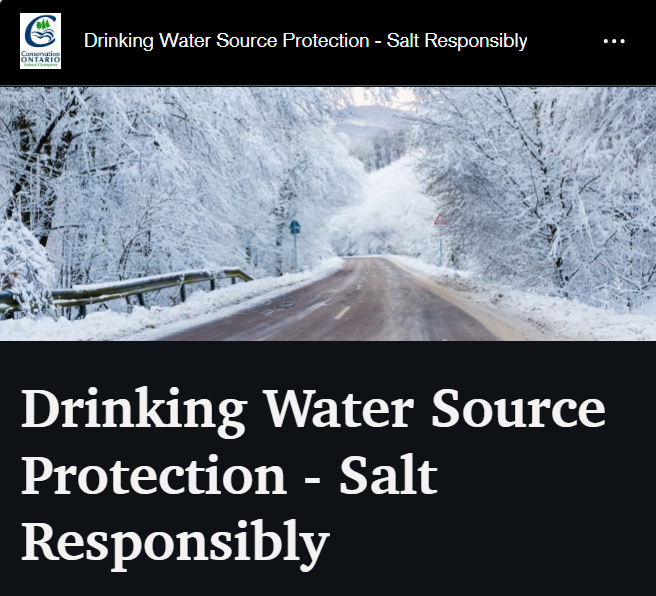
June 2024 – despite last winter (which was milder than usual – thus requiring less salt use for de-icing roads), over the decades salt use on Ontario roads has been increasing.
The Sustainable Technologies Evaluation Program (STEP, dedicated to low impact development) has created a wiki about salt that includes information on impacts on the environment, human health, and built infrastructure. Access the STEP wiki online here.
Nov. 26, 2023 – Reducing road salt use ‘not something that can wait’ as Ontario lakes see oxygen depletion, researcher says (CBC News) – Waterloo region’s salt philosophy is ‘applying the right amount in the right area,’ manager says
October 2023 – FOCA is supporting the industry effort to press for limited liability for private winter maintenance contractors, based on operator certification and ultimately lower salt application practices. Learn more: https://smartaboutsalt.wildapricot.org/
To this end, FOCA participated with over 100 interested parties who gathered at the offices of Landscape Ontario to discuss salt issues: from ecological implications, to infrastructure decline, to safety and liability concerns. FOCA will continue to support the efforts of our partners in academia, industry, and environmental non-governmental organizations to make the case for action to reduce the impact of salt in our precious freshwaters, and of course through our monitoring and tracking of chloride levels in our waterbodies, via the Lake Partner Program (download PDF, 43 pages; see page 9 re: chloride).
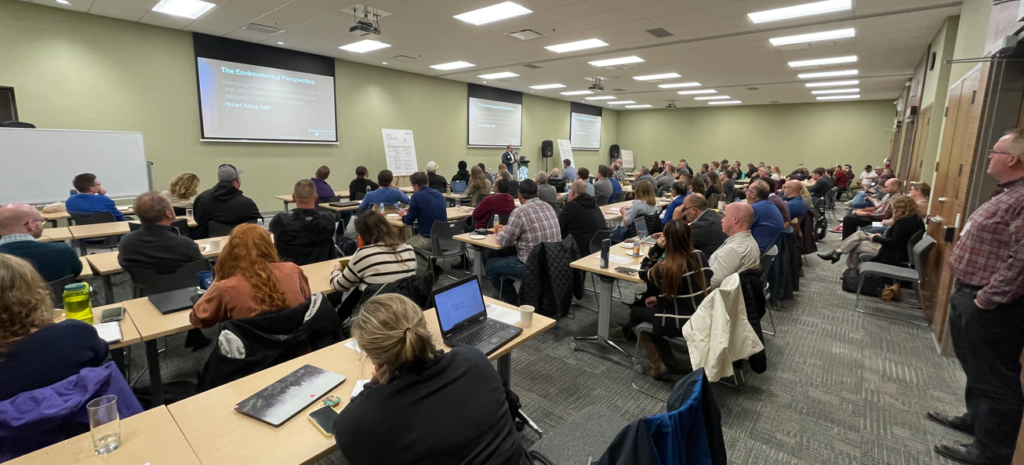
August 2023 – a paper by Shelley Arnott and others, about the effects of chloride and nutrients on freshwater plankton communities, was published in Limnology & Oceanography Letters. Click to read the article (PDF, 8 pages)
March 22, 2023 – Freshwater ecosystems are becoming increasingly salty. Here’s why this is a concern (The Conversation)
February 2023 – Watersheds Canada held a webinar: “Salting our Freshwater Ecosystems” with University of Toronto PhD candidate, Lauren Lawson. Watch the webinar on YouTube.
Since 2020 FOCA has been consulting with the Freshwater Roundtable (FR), a group formed initially in 2019 to deal with Lake Simcoe and their growing salt issue. The members of this group include Lake Simcoe Conservation, Toronto and Region Conservation, Ministry of Environment and Parks, Conservation Ontario, Building Owners and Managers Association Toronto, Landscape Ontario, and the Smart about Salt Council that trains facility owners and operators in winter maintenance good practices.
The FR group was formed to work on a number of initiatives directed at reducing salt application primarily by private maintenance companies, and the public, since many of the challenges with oversalting relate to property maintenance liability and slip-and-fall insurance claims.
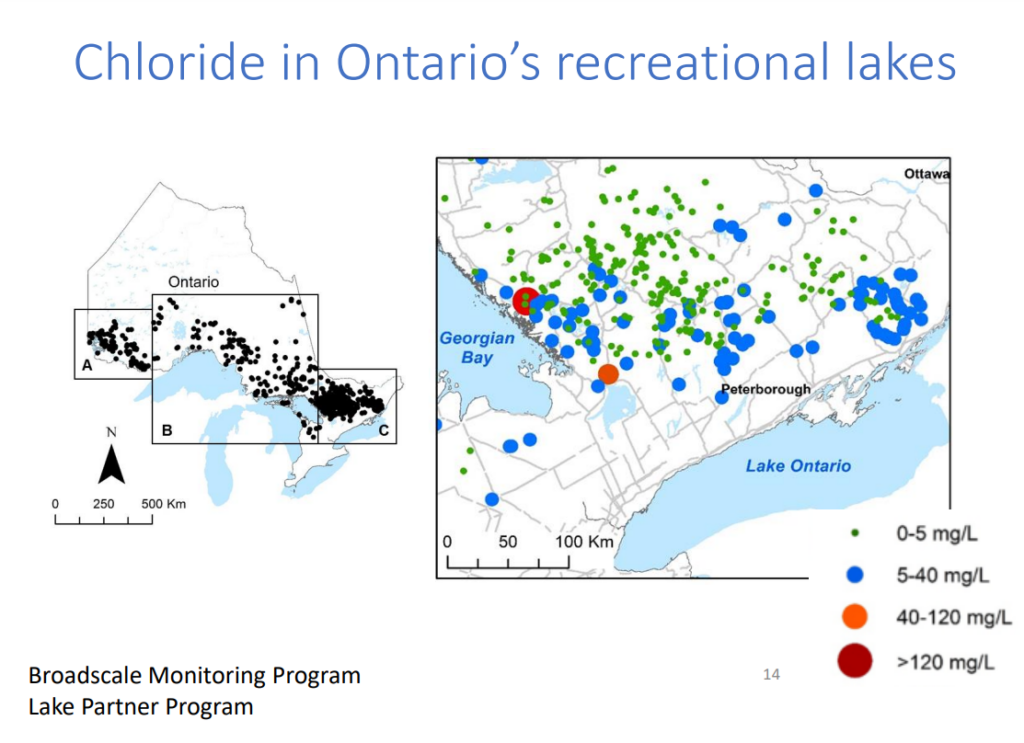
image: Dr. Shelley Arnott (see “Your Role” below)
Efforts are underway to develop a national standard for snow operations, to provide a much-needed benchmark for property maintenance, when it comes to salt and insurance claims. Download a copy of the FR Roundtable 2020 Discussion Paper (PDF, 17 pages)
In January 2022, FOCA and some of these partners met with the Ontario Attorney General about the growing problem of increased and runaway insurance costs for snow removal companies. At this meeting, FOCA pointed out that this has negatively impacted many of our rural road groups who are struggling to find affordable winter road maintenance contractors, in the face of escalating insurance costs. Winter road maintenance ensures access to rural homes for medial and other emergencies, rural services, and the ability to travel for work. The Attorney General was receptive to the topic, but has not been forthcoming with a practical liability cap or other protections, but is instead waiting to see the impact, if any, from Bill 118, the Occupiers’ Liability Amendment Act, 2020.

Learn more about the impact of salt on freshwater systems from FOCA and our partners, and take steps to reduce salt contamination on your own property. Consult the resources below.
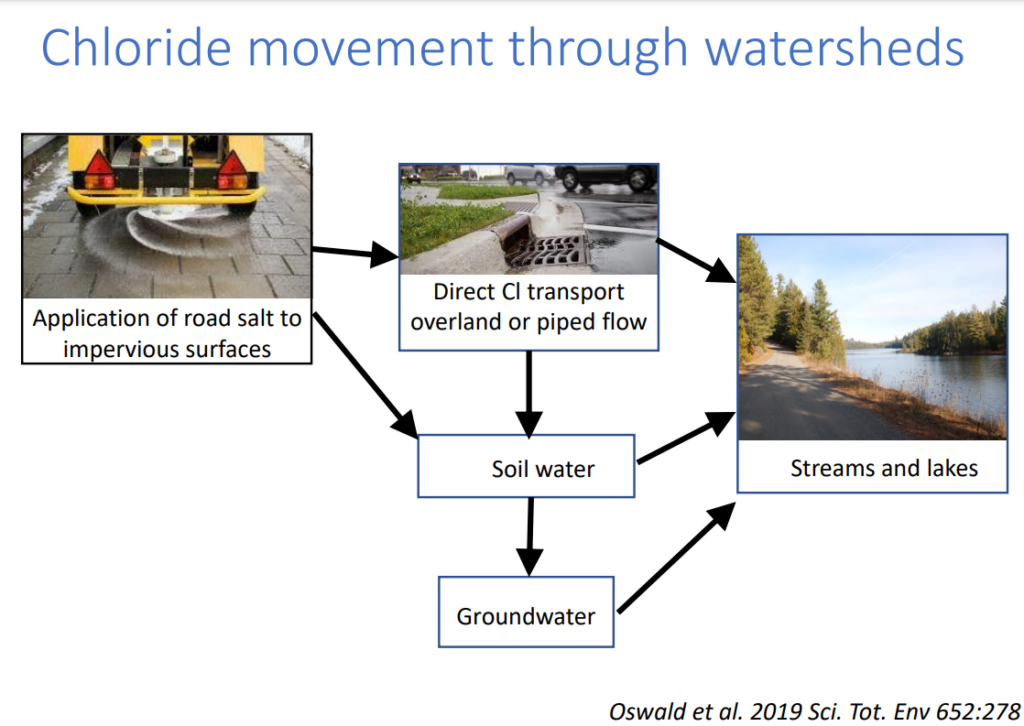
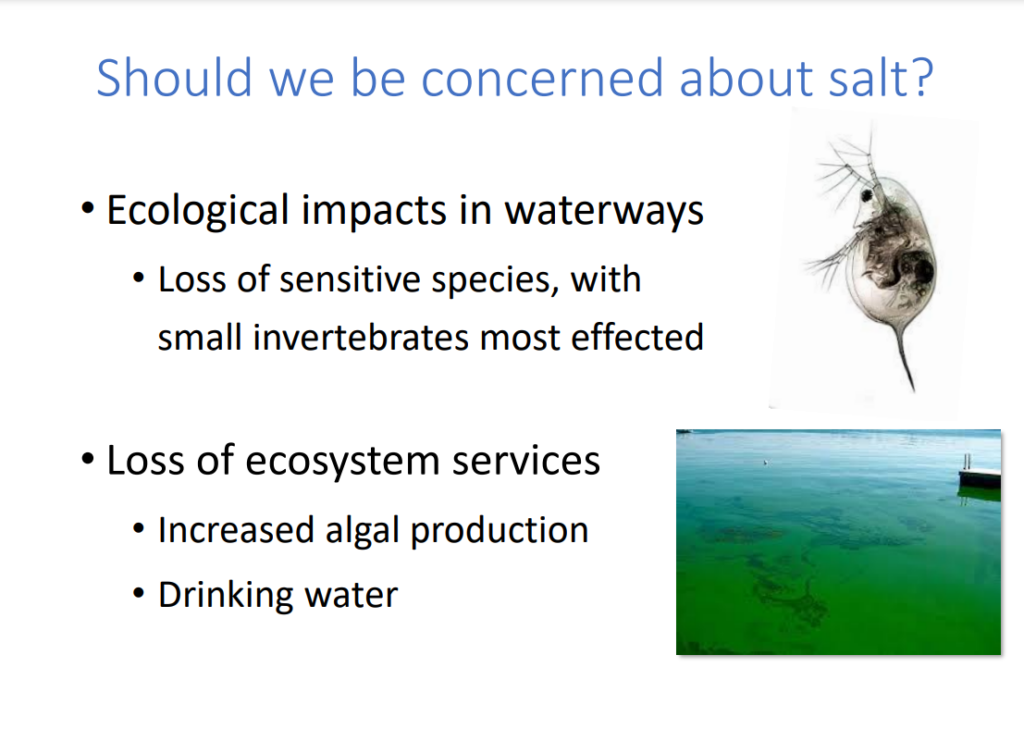
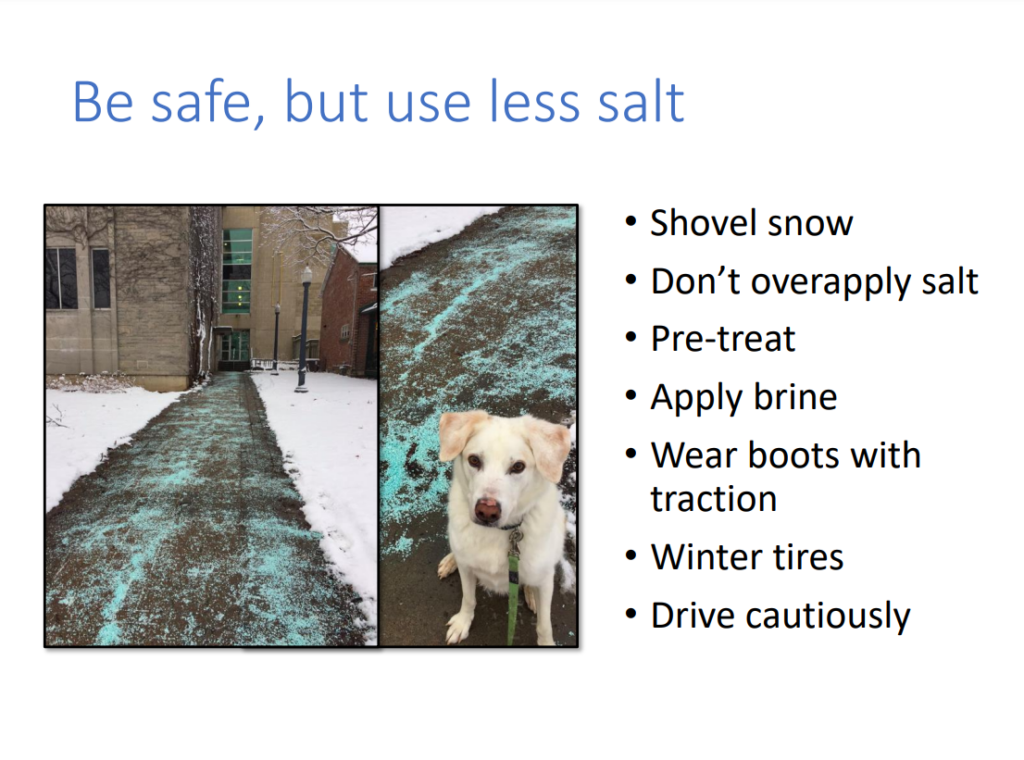
The images above are reproduced from a slide presentation by Dr. Shelley Arnott in 2020, about salt impacts on freshwater. FOCA Members & Friends of FOCA are encouraged to login below to access the full set of slides!
You're missing members-only content!
The following resources are only available to members of our Member Associations & current Friends of FOCA (our annual supporters).
If you are already registered on the FOCA website, please login below with your Username and Password.
Need help with your login? Contact us for assistance during business hours. Not yet a Member Association? Find out why you should be!
Drinking Water Source Protection – Salt Responsibility – This story map from Conservation Ontario provides information, science and actions that the public can take to improve our current salty situation.
Learn more about winter salt from Lake Simcoe Region Conservation Authority.
The Smart About Salt Council is a not-for-profit organization which offers training to improve winter salting practices, recognizes industry leaders through certification, and provides resources to help ensure that the right de-icing product is used, at the right time, and in the right way. Their mission is to protect freshwater from winter salt applied on facilities.

Please note: the following is archival material, and some links to third-party resources may no longer be active.
January, 2023 – Documenting the impacts of increasing salinity in freshwater and coastal ecosystems (Limnology and Oceanography Letters Feb. 2023) Dr. Stephanie Melles et al. They found increasing salinity to be linked with reductions in species and lower zooplankton abundance, and conclude that impacts will be compounded by changes in climate.
February 14, 2022 – Salt contamination of Lake Simcoe a frightening warning about highway expansion – Lake Simcoe is on a trajectory to reach toxic levels of salt in 37 years if current patterns (Toronto Star)
December 21, 2021 – Road Salt in Cities Shows Links to Saltier Water (IJC.org) – “Separate studies in Ontario and Ohio suggest that increasing urbanization over the past 40 years has been a driving factor in freshwater rivers getting saltier.”
November 2021 – Salt Impacts on Lakes: webinar from New Hampshire Lakes: https://www.youtube.com/watch?v=U1it-sbZIHE (Homeowner tips start around minute 42:30 of the recording.)
October 14, 2021 – Sustainable Salt Management Resource Hub (Partners in Project Green)
April 1, 2021 – Study Shows Winter Road Salt Poses Year-Round Threat to Aquatic Life (WaterCanada)
Dec. 2020 – Effects of road-salt application on Cladocera assemblages [zooplankton] in shallow Precambrian Shield lakes in south-central Ontario, Canada – a paper by Robin E. Valleau, Andrew M. Paterson, and John P. Smol (published in Freshwater Science, Vol. 39, No. 4)
June 2020 – Road Salt Impacts Freshwater Zooplankton at Concentrations below Current Water Quality Guidelines – a paper by Shelley Arnott, et al (published in Enivornmental Science & Technology, Vol. 54, No. 15) – “Our results showed that Daphnia were sensitive to low chloride concentrations…”
June 19, 2019 – Chloride maps show devastating effects of road salt. Yes, even in summer (WWF)
January 2019 – Shaking Ontario’s Addiction to Road Salt (Auditor General of Ontario)
December 24, 2018 –The price of salt: How road salts are affecting our Great Lakes (Ontario Waterkeeper)
December 11, 2018 – How Road Salt Harms the Environment (Columbia University)
October 25, 2018 – Setting a Provincial Water Quality Objective for Chlorides (a letter from CELA to MECP)
November 30, 2017 – Time to embrace a difficult conversation – reducing road salts use in Ontario (CELA)
April 12, 2017 – Road salt poses threat to freshwater lakes in parts of North America: study (CP)
May 2011 – Increasing chloride concentrations in Lake Simcoe and its tributaries (Research Gate, Winter et al)
For more about water quality impacts of chloride and other parameters, visit FOCA’s Lake Partner Program webpage.
